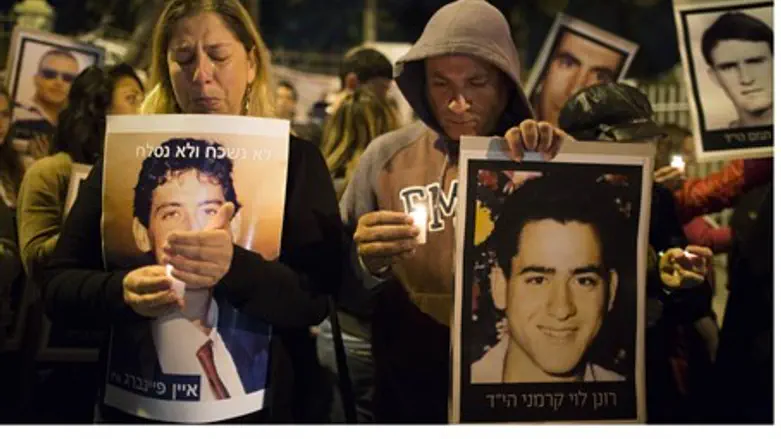
Lt. Col. (ret.) Meir Indor, director of the Almagor terror victims' organization, warned Arutz Sheva that the same sources who worked behind the scenes to pressure Israel into the 2011 Gilad Shalit deal are now trying to do the same for Avraham Mengistu, an Israeli captive of Hamas in Gaza.
Hamas has already indicated that it is confident Israeli media pressure will give it the upper hand in negotiations for Mengistu - who apparently due to mental illness entered Gaza last September as was released for publication last Thursday - in a similar fashion to the popular campaign for Shalit's release that eventually saw Israel concede and free 1,027 terrorists from jail.
"Unfortunately those released in the Shalit deal brought about the murder of officer (Chief Superintendent Baruch) Mizrahi, and the murder of the three teens; these are the prices that we are paying all the time, and there's no sign of regaining our composure," warned Indor.
The terror victim advocate recalled how "in the Shalit deal they led a campaign to 'return the child of all of us home'. And now I once again identify the same lines that should worry us. And it needs to worry anyone who cares about the security of the state of Israel."
"These are the same political and journalistic sources with certain world views including a certain newspaper who want to loosen up the clash with Hamas by releasing terrorists," said Indor. "They have already taken pains for several weeks to break the story and to incite sources in the Ethiopian Jewish community with feelings of discrimination, as if skin color is what motivates the security system."
Indor anticipates that the same public relations experts and journalists who led the campaign for Shalit's release will act again to free Mengistu, as well as the bodies of fallen IDF soldiers Hadar Goldin and Oron Shaul, and another as yet unnamed Arab Israeli captive.
"This time they are disguising themselves in different ways, but the line is the same line. And the heavy price is known in advance; we paid heavy prices in the Shalit deal and in every deal prior to that up to the Jibril deal - we need to prevent that," he said, referencing the 1985 Jibril deal in which Israel released 1,150 terrorists for three captive IDF soldiers.
Hamas ready to 'empty' Israeli jails
Indor's concerns about a prisoner swap along the lines of the Shalit deal appear justified, given that the Hamas paper Palestine ran a full-page article on Saturday asserting that Israeli public pressure will force the government into a deal that will "empty" Israeli prisons of terrorists.
Prime Minister Binyamin Netanyahu met on Friday afternoon with the family of Mengistu, saying, "we will not stop, and we will do whatever is needed to bring these citizens back home."
Internal Security Minister Gilad Erdan (Likud) also weighed in on the issue, warning that "Israel needs to do everything, but not to free terrorists, who return afterwards to carrying out terrorist attacks."
As noted by Indor, massively lopsided prisoner swaps have been common in Israel's history.
Opponents of the Shalit deal warned that giving in to such an uneven deal would wet the appetite of Hamas and induce it to conduct more abductions. They called for Israel to carry out military operations to return captive Israelis rather than risk more terror in the future due to the releases.
In a potential move to counter the problem of massive prisoner swaps and reduce the presence of Arab terrorists in Israeli jails who could be bargained for, on Sunday a bill to have the death penalty applied to terrorists will come up for a key vote in the Knesset.
While Israel already has a death penalty on the law books, it has only been implemented once in the case of Nazi leader Adolf Eichmann, who was put to death back in 1962.
